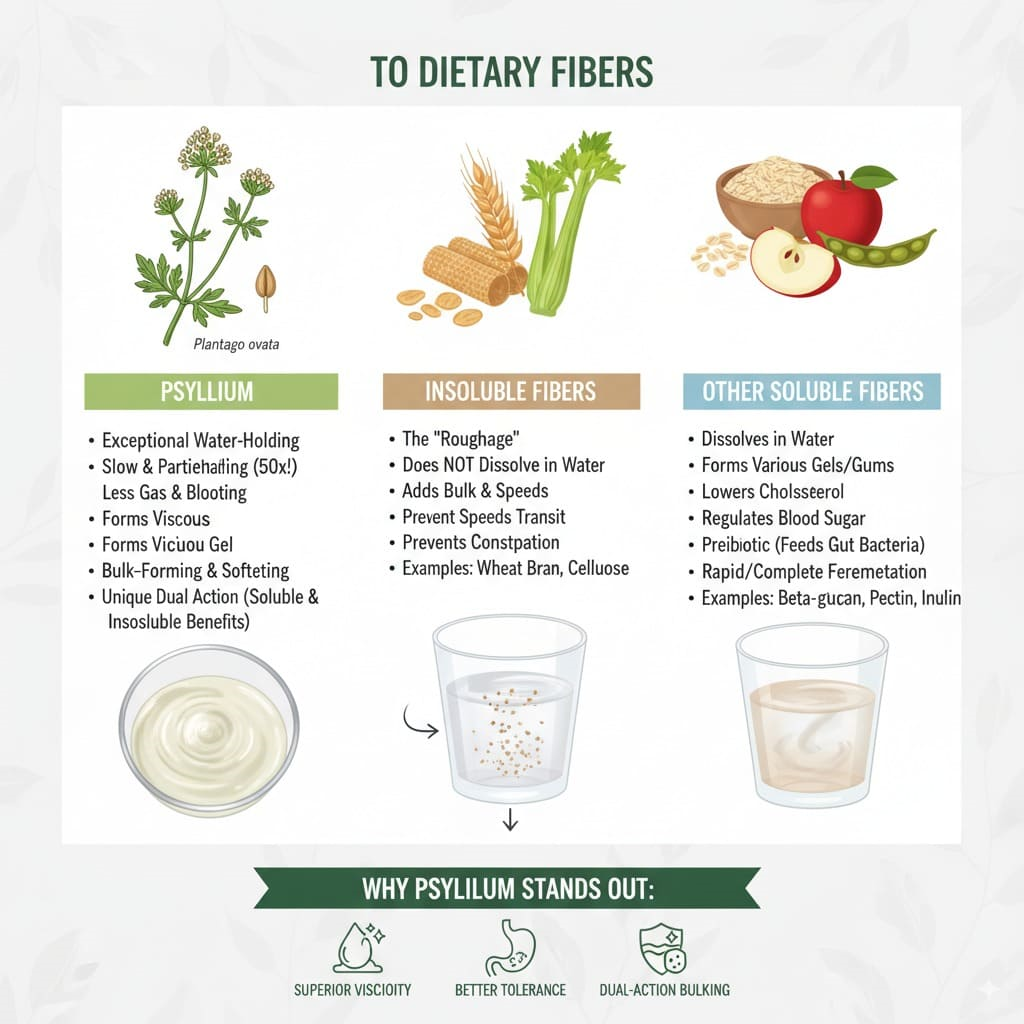Psyllium vs Other Dietary Fibers- Why It Stands Out
In today’s health-conscious world, dietary fibers have become essential for maintaining digestive health, weight balance, and overall wellness. From oats to flaxseeds, multiple sources of fiber are available. Yet, psyllium husk consistently earns its place as a top-performing natural fiber. But what exactly makes psyllium unique when compared to other dietary fibers? Let’s explore why this plant-based, gluten-free fiber has become the gold standard for digestive health and beyond.
What is Psyllium?
Psyllium is derived from the seeds of Plantago ovata, a plant cultivated mainly in India. The husk of these seeds is processed into psyllium husk and psyllium husk powder, widely used in supplements, food products, and pharmaceutical formulations. Unlike many fibers, psyllium is rich in soluble fiber, which means it dissolves in water to form a gel-like substance in the gut — supporting digestion, regulating cholesterol, and promoting a feeling of fullness.

Comparing Psyllium to Other Dietary Fibers
With clean-label trends dominating consumer preferences, organic psyllium is now essential in:
1. Psyllium vs. Oat Bran
- Oat bran is another popular source of soluble fiber, often praised for its cholesterol-lowering properties.
- However, psyllium contains a higher concentration of soluble fiber, making it more effective in managing cholesterol and blood sugar.
- While oat bran works well in foods like cereals, psyllium is more versatile, used in dietary supplements, pharmaceuticals, and gluten-free recipes.
2. Psyllium vs. Flaxseed
- Flaxseed offers both fiber and omega-3 fatty acids.
- Its fiber content, however, is a mix of soluble and insoluble, and requires grinding for maximum benefits.
- Psyllium, in contrast, provides ready-to-use soluble fiber that supports digestion and improves stool consistency without additional preparation.
3. Psyllium vs. Wheat Bran
- Wheat bran is high in insoluble fiber, making it effective for adding bulk to stool.
- The downside: insoluble fiber can be harsh on sensitive digestive systems.
- Psyllium is gentler, forming a gel that soothes the gut and works well for people with irritable bowel syndrome (IBS) or other digestive sensitivities.
4. Psyllium vs. Inulin (Chicory Root Fiber)
- Inulin is a prebiotic fiber, feeding healthy gut bacteria.
- However, it may cause bloating or discomfort in some people.
- Psyllium not only supports digestion but also provides consistent results in weight management, heart health, and blood sugar regulation without excessive side effects.
Key Benefits That Make Psyllium Stand Out
✅ High soluble fiber content – more effective than many fibers for cholesterol and blood sugar management.
✅ Gentle on digestion – suitable for people with sensitive stomachs.
✅ Versatility – used in food grade psyllium, pharmaceutical grade psyllium, and supplements.
✅ Gluten-free and plant-based – ideal for vegan and gluten-intolerant consumers.
✅ Supports digestive health, weight management, and heart health simultaneously.
How Psyllium is Used Worldwide
Food industry: Gluten-free baking, cereals, and functional foods.
Pharmaceuticals: Laxatives, cholesterol-lowering formulations, and blood sugar supplements.
Nutraceuticals: Dietary supplements for digestive health ingredients.
Animal feed: As a safe, natural fiber in feed grade psyllium.
Q1. Is psyllium better than flaxseed for digestion?
Yes. Psyllium provides soluble fiber that forms a gel, improving stool consistency and easing constipation. Flaxseed contains both fibers but requires grinding for maximum benefits, while psyllium is ready to use and gentler on digestion.
Q2. Can psyllium replace other fibers in my diet?
Psyllium can be a primary fiber source due to its high soluble fiber content, but variety is important. Combining psyllium with foods rich in insoluble fiber (like vegetables and grains) ensures complete digestive support.
Q3. Does psyllium help with cholesterol more than oat bran?
Yes. Studies show psyllium is more effective than oat bran in lowering LDL cholesterol due to its higher soluble fiber concentration.
Q4. Is psyllium safe for people with IBS or sensitive digestion?
Absolutely. Unlike wheat bran, which may irritate the gut, psyllium’s gel-like texture makes it soothing and well-tolerated, even for people with IBS or digestive sensitivities.
Q5. Does psyllium cause bloating like inulin (chicory root fiber)?
No, psyllium is generally well-tolerated and less likely to cause gas or bloating compared to inulin, making it a better option for those with sensitive stomachs.
Q6. Can psyllium be used in gluten-free diets?
Yes. Psyllium is 100% gluten-free and plant-based, making it an excellent fiber source for those with celiac disease, gluten sensitivity, or vegan diets.
Conclusion
When compared to other dietary fibers like oa t bran, flaxseed, wheat bran, or inulin, psyllium husk and psyllium husk powder consistently deliver superior results. Its soluble fiber, versatility, and gentle action make it the preferred choice for both individuals seeking better digestion and industries looking for a reliable, bulk fiber supplier. At Akash Agro Industries, we are proud to be one of the trusted psyllium suppliers, exporters, and manufacturers from India, delivering premium-quality psyllium to global markets in bulk, organic, and conventional forms.
